Liberating Music
A
Presentation of Ethnic
Musical Instruments at St. James Cavalier
On
Monday, 5 November, 2001, Marguerite Agius, a member of the cooperative
that runs the fair trade shop L-Arka, will be presenting a number
of fair-traded ethnic musical instruments at St. James Cavalier in
Valletta at 8.00pm. Entrance is free and the general public is cordially
invited to attend.
This
presentation is linked to the drum circle workshops led by percussionist
Renzo Spiteri as part of the one-year “Ritmi” project organised by the
Third World Group. Marguerite Agius will be talking in brief ethnic
instruments like the djembe, tabla, rain stick, flute, the African
xylophone and anklung and about the communities in the poor regions of the
world where they are produced.
Music,
Culture and Fair Trade
In
September Marguerite Agius, a founding member of the local fair trade
cooperative of volunteers, Koperattiva Kummerc Gust, took part in a
two-day workshop on fair-traded musical instruments held in Verona. The
theme of the meeting was “La Musica Verso Liberi e Nuovi Suoni: Storie,
Suggestioni e Strumenti Musicali dal Sud del Mondo” (Music Heading
towards Free and New Sounds: Stories, Inspiration and Musical Instruments
from the South of the World). The meeting was organised by
CTM-Altromercato, the largest fair trade organisation in Italy that brings
together more than 100 world (or fair trade) shops throughout Italy.
The
Maltese cooperative is the only non-Italian member of this organisation.
CTM-Altromercato distributes more than 100 different musical instruments
from around the world through its network of shops. These instruments
include Indian tablas, African djembes, Indonesian anklungs, Mexican
maracas, Peruvian flutes, and Chilean rain sticks and wood-blocks. All
these instruments are imported locally by L-Arka, which is run by
the only fair trade organisation in Malta.
CTM-Altromercato organises regular information
sessions on the fair-traded products it distributes and members like Koperattiva
Kummerc Gust are automatically invited to attend. The Verona
information forum, or “inforum”, was held to
inform fair traders about the cooperatives
in the poorer regions of the world that produce the fair-traded ethnic
musical instruments that one finds in shops like L-Arka.
The
meeting focused on the instruments themselves, how they are played and the
cultures that produce them. Another important element that was tackled was
how these instruments can be used to educate children and young people
about cultural diversity, North-South issues and the concept of fair trade
itself.
Two of the those who spoke at the workshop are
managers of cooperatives producing high-quality musical instruments in
Cameroon and Chile. The manager of the Cameroonian cooperative explained
how the price is agreed upon by the producers and the international fair
trade organisations like CTM-Altromercato. 80% of the instruments
manufactured by this particular cooperative are sold in Europe and
therefore the livelihood of whole communities in Cameroon depends on these
sales. This Cameroonian cooperative from which L-Arka buys many of
its ethnic instruments has a strict programme of reforestation to ensure
that its thriving economic activity (it now provides work for 800 workers
compared to 200 workers 30 years ago when it began) does not jeopardize
the future of the local environment and that of future generations.
Sustainability and Role of Education
Environmental
sustainability is high on the agenda of the fair trade movement. Valeria
Calamaro, who was in Malta for meetings with the local fair trade
cooperative in March 2001 and was present at the Verona “Inforum” on
musical instruments, talked about the reforestation programme of the
Mikono Centre in Nairobi, Kenya. This centre promotes the products of
refugee artisans and is linked to L-Arka. In 1999, L-Arka
imported a large number of sculptures and other high-quality products for
an African Week organised mainly at the University by the Third World
Group. These products, especially the carvings in ebony, were very-well
received.
In her presentation at the Verona meeting,
Valeria Calamaro, who works in the communications department of
CTM-Altromercato, gave a slide
presentation about the drum-making process in various African countries,
focusing mainly on the drums
produced in the city of Machakos, Kenya.
Another speaker was journalist and writer Elisabetta Tosi,
whose publications include the book La kora e il sax. Forme e
protagonisti della musica africana moderna (Emi, 1990). In her
presentation at the Verona meeting,
“Ho l’Africa nelle orecchie: viaggio tra i suoni e i controsuoni del
continente africano tra tradizione e modernità” (There’s Africa in my
ears: a journey through the traditional and modern sounds and countersounds
of the African continent). Elisabetta Tosi spoke at length about
contemporary African music and described it as full of life, articulate
and complex.
Marcello Lorrai, a journalist working with Radio Popolare, Il Manifesto, Musica Jazz and Nigrizia, and co-author of the book La Battaglia del Rai (Zelig, 1988) with Chawki Senouci, discussed the social and cultural dimension of world music today. In his presentation called “Percorrere le musiche, percorrere le culture: per suonarle ai soprusi, alle intolleranze, alle ingiustizie in tutto il mondo”, Lorrai spoke about the liberating role of world music for the cultures of many oppressed peoples of the world. This theme was also taken up by Juan Saavedra, a Bolivian-born fair trader and member of the ethnic music band Rio Colorè. In his presentation called “Ci piace latino: il Sudamerica dei liberi suoni”, Saavedra talked about the “free sounds” of South America. He also played the various instruments he referred to in his talk and described their role in their native cultures.
Being an educator herself, with years of
experience as a teacher at primary level, Marguerite Agius found Oliveiro
Biella’s presentation about teaching the world’s cultures through
music (“La musica insegna le culture del mondo: l’esperienza nelle
scuole”) particularly interesting. This was a practical session in which
Oliveiro Biella, a musician and educator himself, showed Marguerite Agius
and the other participants how to use these instruments in class.
The Story behind Each Instrument
At the Verona Inforum, CTM-Altromercato also
presented an information pack about the cooperatives in Africa, South
America and Asia that produce these musical instruments. The pack includes
a book with contributions on issues relating to fair trade and world music
by the experts who made presentations at the inforum. The pack also
includes 32 individual information cards each describing in detail the
origin, use and role of the various instruments within the communities
that produce them. The cards also give detailed information about the
various cooperatives that produce these ethnic instruments and the
challenges they are facing today. This pack will be used by Koperattiva
Kummerc Gust to promote knowledge about the instruments and the
cultures that produce them and about the concept and effectiveness of fair
trade. Marguerite Agius will be making extensive use of them in her
presentation at St. James Cavalier on Monday, 5 November.
The
person who edited these information cards on the ethnic musical
instruments from Africa, Asia and Latin America is Marco
Moiola. Moiola is a member of the team that selects the instruments
for CTM-Altromercato. He was born
in Bolzano and now lives in Verona, but he has travelled all over the
world, especially in Africa. He has a passion for music and for
instruments as “speaking objects” (what he calls “oggetti
parlanti”) that are there “to be discovered and to help discover”.
Apart from being a member of CTM-Altromercato, Koperattiva Kummerc Gust is a member of APEX, the assocation of Maltese cooperatives; Etimos, an Italian organisation working in the field of ethical finance; and IFAT, the International Federation of Alternative Trade.
The presentation by Marguerite Agius at St. James Cavalier is being organised by the Third World Group and L-Arka with the collaboration of Renzo Spiteri and the support of the management of the St. James Cavalier Centre for Creativity.
For more information about this and other activities within the Ritmi project, log on to http://ritmi2002.cjb.net (email ritmi@mail.com) or phone L-Arka on tel. 244865.
Adrian Grima
(Coordinator, “Ritmi”)
October, 2001
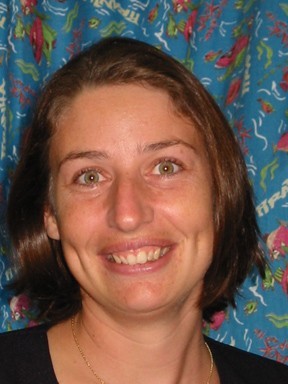
Marguerite Agius

The "anklung" is supplied by a Javanese organisation made up of many different cultural and religious groups. This project involves something like 2000 people who depend entirely on their craftsmanship for their livelihood.

The "calebassa" made from pumpkin.
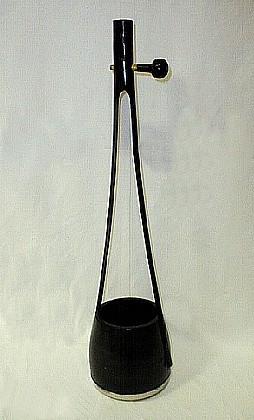
The fascinating "ektara" made of wood is made India by an organisation of women that coordinates the production of crafts by over fifty groups and about fifteen village communities.
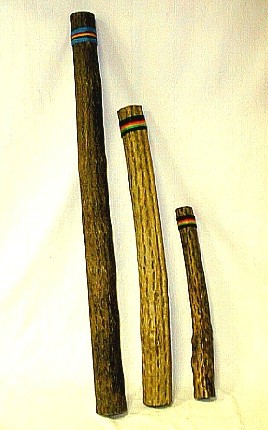
Bamboo rain sticks are made in Mexico and cactus rain sticks are made in Chile.
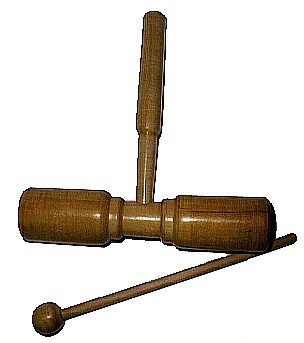
These wood-blocks are made in Chile by an organisation that brings together a number of small artisans who would otherwise be exploited by the unfair market prices.
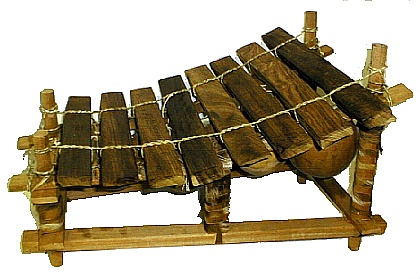
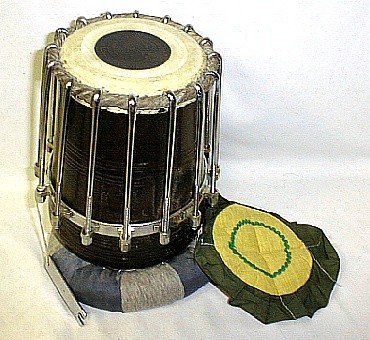
This tabla is made in India. The tabla is said to have been introduced, together with the sitar, by the poet and musician Amir Kushrow towards the end of the year 1200.

Ghall-Ewwel Pagna | To the First Page